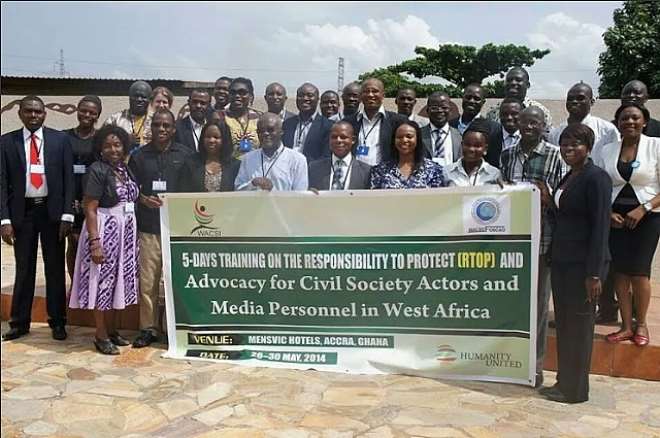
The West African Civil Society Institute (WACSI) in partnership with Humanity United and the West African Civil Society Forum (WACSOF), have put together a 5-day training workshop on the Responsibility to Protect (RtoP) for civil society organizations (CSOs) and media practitioners in Accra.
The training which started on Monday, 26th May and expected to end on Friday, 30th May brought together some keys CSOs and media practitioners from West African countries including Guinea, Ghana, Nigeria, Togo, Mali, Cote d’Ivoire, Liberiaand Burkina Faso.
The objectives of the training is to raise and deepen awareness on the RtoP norm and global principles; bridge the knowledge gap of the CSOs and media RtoP; and to provide participants with new advocacy strategies to engage and influence government to uphold the commitment made at the 2005 World Summit on the RtoP.
The 5-day training also aims at building the capacity of the participants, educating and deepening their awareness, and to expose them to diverse advocacy skills and techniques that are requisite to engage and hold governments accountable for their commitment on RtoP, as well as to jointly identify strategies.
In an address, the Executive Director of WACSI, Ms. Nana Asantewaa Afadzinu, the issue of RtoP have been a subject of interest and most talked about at the United Nation, African Union and the ECOWAS level, but its implementation is ineffective at the national level.
According to her, the uprising of violence and terrorism in some part of West Africa, for instance, Nigeria and the story of Boko Haram, are as a result of the ineffective implementation of the RtoP at the national level because CSOs and the media have not had their capacities built for that task.
Ms. Afadzinu said the CSOs and media have a responsibility to ensure that governments of the West African countries take actions, adding that this could be ensured by first getting them (the CSOs and media) to understand the RtoP and how to bring down to the various West African countries and down to the local level.
She said CSOs and the media must task governments to ensure that their citizens are protected and to act on time when there is violence.
Nana Afidzanu was optimistic that the training would be successful with its outcome put into practices and not a ‘talk shop’.
‘After this training, I hope we would use what we have come to learn. It wouldn’t be just theories but practical as well,’ she said.
Ms. Omolara Balogun, a Policy Advocacy Officer at WACSI, reiterated that there is much security challenges in the sub-region, a situation which is making the West African states unsafe to live in, therefore, the need for such training.
‘It is time we come together as CSOs, media persons to see the way forward and how best these security issues would be address and dealt with,’ she emphasized.
The Policy Advocacy adviser expressed the hope that after the training, the work of the CSOs and the media in the sub-region would be enhanced to achieve results in the RtoP.
In a short remark, Ms. Elise Ford, of Humanity United, said her organization is happy to collaborate with WACSI for such an all-important programme, and hoped that the outcome would help restore peace and serenity in the violence-plagued West African countries.
The training had Dr. Jide Okeke, an African Security Analyst with the African Union; and Dr. Cyril Musila, a professor, researcher and an international consultant and expert of the Africa Union Border Programme, as resource persons.
This article has 0 comment, leave your comment.

